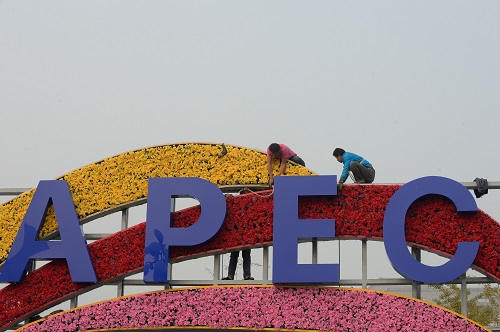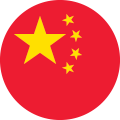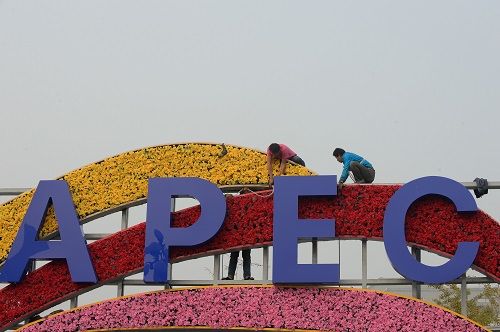 이미지 확대보기
이미지 확대보기중국은 해외 투자에 대한 몇 가지 제약을 완화하려 한다고 제안했다. 여기에는 전자상거래, 배터리, 철도화물, 그리고 화학 약품과 같은 분야가 포함되며 이러한 조치로 중국의 외국 투자가 좀 더 손쉽게 이루어지는 데에 도움이 되리라 전망한다.
새로운 규정은 외국 기업이 국내 기업과 합작 산업이 요구되는 부문이나 소수 지분으로 제한된 분야를 79개에서 35개로 줄였다.
하지만 제외된 부문 중에서 몇몇은 외국 기업에 제한된 채로 남을 수밖에 없는데 이는 또 다른 규정들 때문이다. 또한 새로운 산업 대부분은 규모가 작고 전문화되었거나 이미 경쟁력 있는 중국 기업들이 시장을 장악하고 있기 때문이다.
현재 몇 가지의 제한을 완화시킴으로 중국은 해당 시장에서 상호 간의 투자 장벽을 제거할 기회가 만들어질 수 있기를 기대하고 있다.
새로 개방된 분야의 예로 희귀 목재 가공, 고급 중국 주류 브랜드, 영화관과 특정 종류의 불도저와 토공 기계가 포함된다. 하지만 중국 기업이 별도로 내세운 해외 투자가 완전히 금지된 산업 목록에는 유전자 조작 상품, 담배, 지질학 관련 또는 지도 제작 서비스, 경매 전문 회사, 그리고 골동품 상점이 새롭게 포함될 것이다.
현재 해외 투자가 금지된 중국 차 가공과 전통 옻, 그리고 에나멜에 대해서는 몇 가지 유형의 배터리에서처럼 금제가 풀릴 것이다.
제안된 변화는 중국의 국가발전개혁위원회의 공공 협의안에 게재되어 있다.
중국의 유럽 상공 회의소장 외르크 우트케는 "중국이 새롭게 발표한 '해외 투자의 안내를 위한 목록'은 어떤 부문에서는 해외 투자에 대해 또 하나의 발전으로 이어질 것이다"면서 "하지만 짧은 네거티브 리스트와 더불어 투자 목록을 전체적으로 제거하는 것, 그리고 서비스 부문에서 제한 완화를 더 늘렸더라면 더 좋았을 것이다"라고 밝혔다.
최근 제안은 때마침 며칠 후 APEC(아시아·태평양 경제 협력체) 지역 대표자 회의를 주최하는 베이징의 이미지를 개선시키기 위함으로 보인다.
중국의 지도자들은 회의에서 지역의 자유 무역을 추진하려고 하지만 미국과 다른 국가들이 환태평양 전략적 경제동반자협약으로 알려진 그들의 협약을 추구하고, 이 협정에 중국은 포함되어 있지 않으므로 아시아 전체의 협정에 관해서는 중요한 진전은 보이지 않을 것으로 전망된다.
베이징은 또한 중국으로의 해외 직접 투자가 최근에 약세를 보이는 것에 대해 걱정하고 있다. 이는 올해 차분한 경제 속에 1990년 이후 가장 약한 연간 성장률을 보이고 있다.
올해 첫 아홉 달 동안 중국으로의 투자는 지난해 같은 기간보다 1.4퍼센트 낮아졌지만 7월과 8월 동안에는 각각 14퍼센트와 17퍼센트 감소했다.
세계금융위기 동안의 하락을 제외하고는 중국으로의 해외 직접 투자는 세계 무역 기구에 가입한 2001년부터 꾸준히 성장하고 있었고 작년에는 1180억 달러의 기록을 세웠다.
중국은 1996년부터 해외 투자 목록을 가지고 있었고 후에 대략 3년마다 개정하였다. 목록에는 정부가 해외 기업이 투자하기를 바라는 수백 개의 부문과 산업을 포함하고 있다.
/Financial Times 원문
China looks to ease curbs on foreign investment
China has proposed lifting some restrictions on foreign investment in the country, including in sectors such as ecommerce, batteries, rail freight and chemicals, as it tries to smooth the way for surging Chinese investment abroad.
The new regulations would reduce from 79 to 35 the number of sectors in which foreign companies are required to form joint ventures with domestic businesses or are limited to minority stakes.
However, several of the sectors removed from the list will remain restricted to foreign companies because of separate regulations and most of the newly opened industries are small and specialised or are already dominated by highly competitive Chinese companies.
Beijing is increasingly under pressure to remove tight restrictions on foreign investment as its own companies expand investments all over the world, including Europe and the US.
By loosening some restrictions now, China hopes to reduce the chances of reciprocal investment barriers being introduced in those markets.
Examples of newly opened sectors include rare wood processing, high-end Chinese spirits brands, movie theatres and certain types of bulldozers and earthmovers.
But a separate Chinese government list of industries in which foreign investment is completely banned will be expanded to include new categories of genetically modified products, tobacco sales, geological and mapping services, auction houses and antique shops.
A current ban on all foreign investment in specialist Chinese tea processing and on traditional lacquer and enamel would be lifted as would bans on foreign investment in some types of battery.
The proposed changes were published for public consultation by China’s National Development and Reform Commission.
“China’s call for public comments on a newly revised draft of the ‘catalogue for the guidance of foreign investment’ appears to be another incremental development for foreign businesses in some sectors,” said Jörg Wuttke, chairman of the European Chamber of Commerce in China. “However, the removal of the investment catalogue altogether, in favour of a short negative list, and increased opening in the service sectors, would have been more ambitious.”
The latest proposal appears timed to improve Beijing’s image as it prepares to host the Apec regional leaders’ meeting in the coming days. Chinese state media lauded it as a significant liberalising move.
China’s leaders are hoping to promote regional free trade at the meeting but significant progress on any Asia-wide agreement is unlikely to be forthcoming as the US and other countries pursue their own pact, known as the Trans-Pacific Partnership, which excludes China.
Beijing is also worried about recent weakness in foreign direct investment into China, which comes as the economy is poised this year to grow at its weakest annual rate since 1990.
Total investment into China in the first nine months of the year was down 1.4 per cent from the same period a year earlier but in July and August investment into China dropped 14 per cent and 17 per cent respectively from the same months a year earlier.
Apart from a drop during the global financial crisis, FDI inflows to China have grown steadily since the country joined the World Trade Organisation in 2001 and reached a record $118bn last year.
China has had a foreign investment catalogue since 1995 and has revised it roughly every three years since then. The catalogue also includes hundreds of sectors and industries in which the government encourages foreign companies to invest.





















![[뉴욕증시] 6월 고용 호조에 3대 지수 상승](https://nimage.g-enews.com/phpwas/restmb_setimgmake.php?w=270&h=173&m=1&simg=2025070406301007176c35228d2f5175193150103.jpg)




















